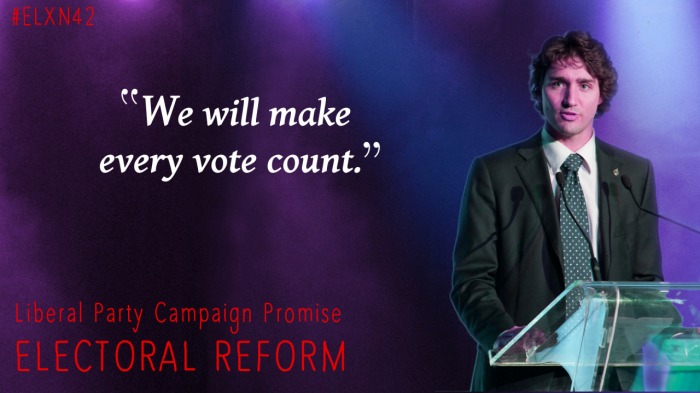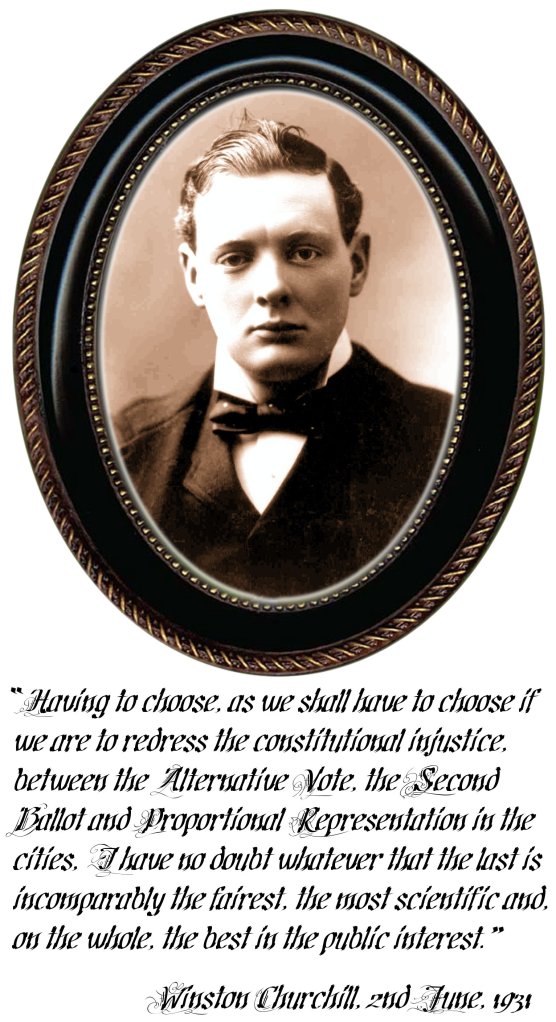
This is the twenty-fourth article in the Whoa!Canada: Proportional Representation Series
On the 1st anniversary of the Liberal Majority, Prime Minister Justin Trudeau suggests Canadians have lost our “appetite” for electoral reform now that his party has won a majority government.
A majority built on 39% of the votes cast.
Just as Mr. Harper had a majority built on 39% of the votes cast.
Our Electoral System Is Changing
Something unprecedented happened in the 42nd Canadian federal election of 2015. Every party — except the one in power — campaigned on electoral reform. This is something that would never happen without wide spread dissatisfaction with the electoral system we use now.
When most people feel they can’t vote for what they want, even if the person they vote for is elected, they don’t have the representation in Parliament they want. When the system fails to serve us, we don’t feel engaged in or satisfied by the process. When a majority of voters are routinely unrepresented, when some votes count more than others, but most votes don’t count at all, there is something wrong with an electoral system.
Even though we don’t understand the problem or know how to fix it, we know something isn’t working. So when Mr. Trudeau said, “We will make every vote count,” it resonated with Canadians.

 The Liberal Party promise was itself an acknowledgement of the uncomfortable truth that every vote does not count in the voting system Canadians use now.
The Liberal Party promise was itself an acknowledgement of the uncomfortable truth that every vote does not count in the voting system Canadians use now.
So it shouldn’t come as a surprise that a lot of Canadians were less than pleased to read the ipolitics report: Trudeau taking heat for walking back electoral reform: Prime Minister tells Le Devoir Canadians’ motivation for change has weakened.
Our votes need to count as much today as they did last October.
The electoral reform process has barely begun. Although the public consultation is over, the ERRE Committee hasn’t even finished hearing experts.
Your vote should count. And so should mine. All of our voices deserve to be heard, but they won’t be until we have a fair electoral system. Canadians have been waiting for meaningful electoral reform for a hundred and fifty years. We can’t let them walk away from this election promise, this is our historic opportunity to create a stronger democracy and public policy that serves all Canadians.
Please phone or email your MP to let them know that we expect them to keep their election promise to make every vote count.
Tell your MP that backing off on electoral reform will lose your vote.
Here are the phone numbers and email addresses of our Waterloo Region Liberal MPs.
Bryan May – Cambridge
telephone: 519 624 7440
email: Bryan.May.P9@parl.gc.ca

Marwan Tabbara – Kitchener- South Hespeler
telephone: 519 571 5509
email: Marwan.Tabbara.P9@parl.gc.ca

Bardish Chagger – Waterloo
telephone: 519 746 1573
email: Bardish.Chagger.P9@parl.gc.ca
Raj Saini – Kitchener Centre
telephone: 519 741 2001
email: Raj.Saini.P9@parl.gc.ca
Read the article in Le Devoir
or the English Translation
If you aren’t in Waterloo Region, you should contact your Liberal MP too. And if you don’t know who your MP is, you can find out here by Postal Code. If you know who it is but need the contact info you can find it here by typing your MP’s name.
And no matter where you live, you can sign the Broadbent Institute’s
Petition: Justin Trudeau, keep your promise to bring in electoral reform
Image Credits:
Justin Trudeau by A.k.fung has been dedicated to the Public Domain, which made it possible for me to dedicate my mini-poster to the Public Domain as well.
• Proportional Representation for Canada
• What’s so bad about First Past The Post
• Democracy Primer
• Working for Democracy
• The Popular Vote
• Why Don’t We Have PR Already?
• Stability
• Why No Referendum?
• Electoral System Roundup
• When Canadians Learn about PR with CGP Grey
• Entitlement
• Proportional Representation vs. Alternative Vote
• #ERRÉ #Q Committee
• #ERRÉ #Q Meetings & Transcripts
• Take The Poll ~ #ERRÉ #Q
• Proportionality #ERRÉ #Q
• The Poll’s The Thing
• DIY Electoral Reform Info Sessions
• What WE Can Do for ERRÉ
• #ERRÉ today and Gone Tomorrow (…er, Friday)
• Redistricting Roulette
• #ERRÉ submission Deadline TONIGHT!
• #ERRÉ Submission by Laurel L. Russwurm
• The Promise: “We will make every vote count” #ERRÉ
• FVC: Consultations Provide Strong Mandate for Proportional Representation #ERRÉ
• PEI picks Proportional Representation
• There is only one way to make every vote count #ERRÉ
• Canada is Ready 4 Proportional Representation
• Sign the Petition e-616
• #ProportionalRepresentation Spin Cycle ~ #ERRÉ
• International Women’s Day 2017 ~ #IWD
• An Open Letter to ERRÉ Committee Liberals
and don’t forget to check out the PR4Canada Resources page!












